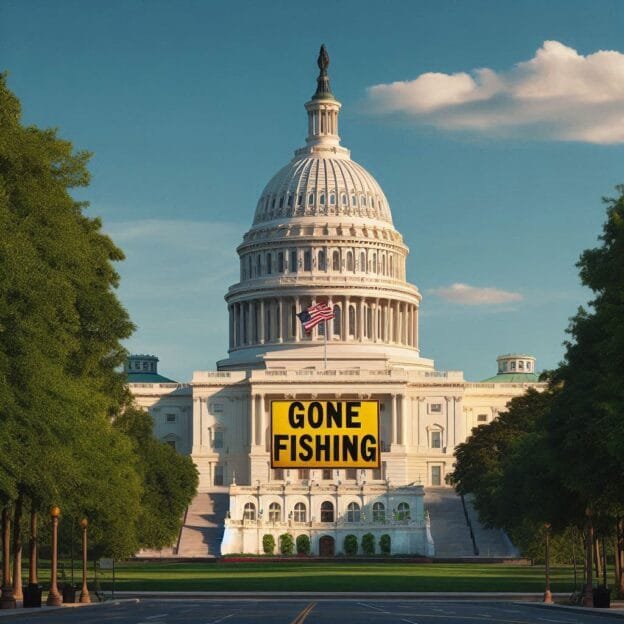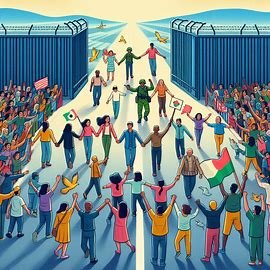I recently watched a Reason YouTube video called “What’s the ideal immigration policy?”. It was basically a debate between libertarians Dave Smith (who I’ve been familiar with for a few years) and Chris Freiman (who I had never heard of) hosted by Zach Weissmueller and Liz Wolfe on their “Just Asking Questions” series. Mr. Smith’s position was basically that controlling the borders was completely inline with libertarian principles. Even going as far as saying it was communist not to want to control the borders. (Though this may have either been hyperbole or using communist outside of the definition that includes central planning. I’ve at least argued with socialists that take this position.) Mr. Freiman’s position was that freedom of movement and association were key libertarian principles that would be violated by government restricting immigration.
The term “open borders” was also thrown around. I’ve struggled with this term myself, believing I support open borders, but still allow for restrictions WRT safety. Maybe the best way is defining what I mean by open. First, and what I believe is the easiest to make a libertarian case for, is labor. Anyone that wants a job and has someone else willing to give them that job, should be able to enter into that contract. I also believe a lot of opposition to open borders is opposition to this very thing. That’s what I call “centrally planning” labor. Politicians, or the “ruling elite” if you will, decide how many of what type of labor should be allowed into the country. I also believe tourism, visiting relatives, and other forms of voluntary association shouldn’t be restricted.
Before I go too far, however, let me address a concern I think libertarians on both sides of this debate have: Tax-payer charity, i.e. “welfare”. It has been stated that “You can’t have open borders at the same time that you have a welfare state.” Even by my favorite libertarian, Milton Friedman. I have to respectfully disagree. Those 2 restrictions on freedom are absolutely, 100% mutually exclusive. Having one doesn’t justify having the other. If tomorrow, the “open borders” legislation was passed and signed, it could state that no immigrants are eligible. (On a side note, it could and should also state that no one is eligible, but that’s a different subject.) If it didn’t have that caveat, would I still support it? I’m not sure, but am leaning towards no.
I also think a lot of the debate hinges on restriction of public property. “Using heroin in a public school bathroom” was the prime example of libertarians supporting some restrictions. I too, agree with restrictions, but, to be fair, no one was suggesting we only limit immigrants from doing this, but citizens were free to do what they want, especially as taxpayers. It was the act that we democratically decided (yes via the “ruling elite”) that was bad. Not the immigration status of the individual consuming the heroin. The same is true, of course, of using roads (funded via gas tax) or even being on public property in general. What if an immigrant wants to just come here and sleep on a park bench? Again, I’m not sure what the answer to homelessness is, but I don’t think it should be based on immigration status (with maybe public systems being subject to the same caveat I endorsed for welfare).
Culture was also given as an acceptable reason (I believe even a libertarian reason) for restricting immigration. This I wholeheartedly reject. People are free to associate, eat, dress, etc. as they wish. In fact, IMHO, one of the best advantages of a system as free as ours is that various cultures can express themselves as freely as they want (as long as the non-aggression principle is respected, of course).
Voting, on the other hand, or the right to vote, is completely up to democratic decision making. I think a lot of the desire to restrict immigration has to do with the party that’ll be perceived to gain the most politically. Which is of course, the democrats. Republicans believe it and don’t want them voting. Democrats believe and absolutely want them to vote. In fact, Democrats keep immigrants in the shadows by rejecting compromises that’ll limit the path to citizenship. I feel this is probably the topic of another post, but let me just say, I’m 100% with letting immigrants in, especially to work, without any path to citizenship, or even if we say limit the number of naturalized citizens on an annual basis. To me, that’s much more in line with liberty than limiting who can and can’t work.
Probably, the last major category of determining the free flow of immigration is asylum. Our current system is government based, but, as always, I’d prefer a private solution. Reason has another great article on the future (and past) of this phenomena in the United States. I’d say this is a subcategory of general social services.
I’m just going to wrap up by saying the Reason discussion is a great watch. They did a great job of pointing out where different flavors of libertarianism may have differing opinions on the subject. Though I personally lean “open borders”, I can see reasoning behind certain restrictions.



